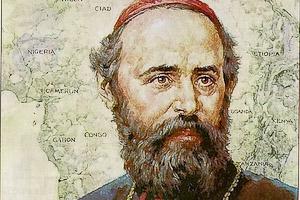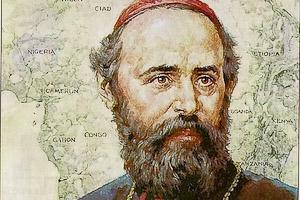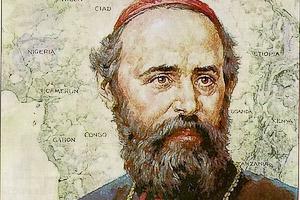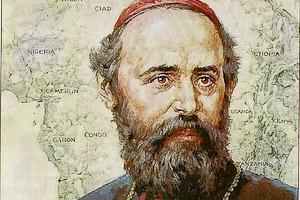Daniel Comboni
Comboni Missionaries
Institutional area
Other links
Newsletter
For a growth-conversion of the Comboni Missionary.
Paging through the writings of our Founder that deal with the presence of human values in his life it is possible to see a journey of serene growth towards a human ideal which, even though on the one side it is never fully achieved and remains open-ended, on the other side it is an invitation to introspection and to an effort to improve more and more one’s humanity, so that the missionary consecration will be better accomplished.
We will highlight some aspects that perhaps will not even be the most relevant, but that can nonetheless spur us to a sincere and serene overview of our own humanity and vocational personality, since growing as human persons is a constant task of formation, that will only end when we breath our last1.
Looking at the Founder
A) Basic trust is the virtue or human value by which human beings show confidence in themselves, in others, in the world in general and, in their lives of faith and hope, also in God. Those who do not trust themselves are not able to place their trust in others or even in God.
The presence of this basic trust in Comboni, undoubtedly nurtured since his infancy by the love and education he received from his parents, fostered the inner growth of a healthy self-esteem. This fact prepared him to develop a true faith and trust in God and to believe in others, in the Church and in his co-workers, even when he knew they would create problems for him (S 6465).
Even though Comboni often stated in his writings that he who trusts in himself trusts in the biggest jackass in the world (S 2459), there are many passages in his writings where he shows trust and confidence in himself. Definitely, his faith in the Lord Jesus and his enormous confidence in God are based on this trust. God rewards those who trust in Him (S 4012) and never abandons them (S 4387): “My whole trust is in God who sees all things, can do all things and loves us.” (S 172)
In Comboni this great human value takes shape also in the opening of his work to all missionary forces. His work, in fact, must be Catholic and not just Spanish, French, German or Italian (S 944). It can be seen also in his relations with the Africans (S 1105), whom he loved deeply even to the giving of his life for them, in an historical context in which very few people knew how to do that, as he instead recognised their dignity as human beings and as brothers and sisters (S 2742).
In Comboni also the experience of hope is connected to the human value of trust and he will always maintain that his work will not die (S 5329), because God never abandons those who trust in him (S 7246). If there is trust and hope, also courage never wanes (S 1431), especially because of a certainty based on faith that the works of God are always born and grow at the foot of the Cross (S 2474).
B) The experience of personal identity is the conscious and serene synthesis of all the human dimensions of a person who knows itself, accepts itself and knows how to optimise all that it has and does; the subject is enabled to remain faithful to itself and to others and to honour life-time commitments, notwithstanding the influence of contradictory conditionings or of value systems not in line with one’s own.
The certainty of his vocation supported Comboni to the day of his death, because his vocation identity, confirmed by Fr. Marani (S 6886), was based on a strong and well structured human identity that made him creatively faithful to and totally identified with his task.
The ability to first incorporate one’s vocation in a sure human identity and then to live it with dedication and faithfulness is only possible if it starts from one’s early youth. This was certainly true in Comboni who will say later: “The first love of my youth was for the unhappy Nigrizia…” (S 3156). Since that time, there was never another passion in his heart, except for Africa and the poor and abandoned Africans (S 6983).
From the human and psychological point of view one marvels at seeing the faithfulness of Comboni to the charism he had received: the tremendous difficulties he encountered, and even more the criticism and the accusations that wounded his heart, never broke down his human and vocational identity, but moved him to look for other solutions or other connections. He knew who he was and to what he had been called. He could not be different and could not operate differently. His missionary vocation was based on a clear human identity.
C) To be fruitful means to know how “to give life,” how to nurture others, to be their “father and mother,” to live for them without expecting anything in return.
A solid personal identity gave Comboni the ability to share with others all that he had and was, to the point of caring for them and being responsible for them, to bring forth life in those he had chosen as object of his love: the poorest and most abandoned Africans.
In his famous homily of Khartoum, he verbalised with great clarity the feeling of his spiritual paternity: “I am already your father and you are all my children… I embrace you and keep you close to my heart.. Your good will be mine and your sorrows will also be mine. I intend to make common cause with each one of you and the happiest day of my life will be the one when I am able to offer up my life for you.” (S 3157ff)
A short synthesis of this emotional maturity which has become fruitfulness, and which Comboni lived in its fullness and also demanded from his missionaries, may be summed up in these words: “I give my life for this holy task that I have chosen…” (S 2569). The same he asks from his missionaries: “Holy… but this is not enough: we need a charity that makes us dedicated people,” because “missionaries do not go to heaven alone,” and must be “not goody-goodies, but daring and courageous souls who know how to suffer and die for Christ.” (S 6655-6656)
D) The feeling of wholeness is the personal experience of being vocationally fulfilled in life and the joy of having lived it substantially well to the end. Wholeness in fact is that human value that allows a mature person to feel unified and integrated, happy with all that it has accomplished in life. The love of such person becomes truly Catholic, open to the great needs of humanity. The person then is ready to hand on the “gift of being a witness” to others, knowing that they will carry on, as he is willing to even accept his death serenely. This is true wisdom. In the specific field of faith, the person who has achieved this wholeness, has also achieved the highest fulfilment, namely holiness.
“I die, but my work will not die” is the certain hope that we can gather from some of the Founder’s writings (see e.g. S 4380, 5329). It expresses the deep conviction that one’s life was not lived in vain and that the good seed will bear fruit. Comboni was sure that, if a missionary has a heart warmed by the pure love of God and looks at his/her work with faith, then death and martyrdom are the most desired reward of all trials (S 2705). He would have liked, in fact, to have at his disposal a hundred tongues and a hundred hearts to entrust his Africa to the care of many, but he also knew that the many lives of his co-workers would be the fruitful seed of new apostles and future Christians (S1215). “I can only have one life to offer for the salvation of those souls: I wish I had a thousand to be consumed for this end.” (S 2271).
Encouragement to Maturity and Growth
In view of our own growth and conversion, it may be useful at this point to allow ourselves to be challenged by the values of our Founder and to ask ourselves some questions.
a) With regard to trust we may ask ourselves in all sincerity whether it is truly present in us as individuals, as communities and in our apostolic activities. We cannot always take for granted a healthy trust in ourselves, a true trust in God and the ensuing trust in others, beginning with those who are near us on a daily basis. These can be some of the immediate consequences: difficulties in living together in the community and of cooperating by sharing personal values, common projects and the means the Lord sends us; trusting more in money than in Divine Providence, in structures rather than in people; the serene and brotherly acceptance of other cultures and of the exquisitely Comboni gift of an international community…
b) With regard to our identity it may be good to check the quality of our sense of belonging to our Institute and of a healthy pride for being members. “Saint” Comboni invites us again to be holy, but also committed in the field of charity. Here are some practical aspects to check our growth in this human value of identity: double or multiple memberships showing a probable lack of identity as Comboni Missionaries; the problem of few new people joining us and many leaving us, but also a doubtful belonging for reasons that are no longer authentic; not being able to read the signs of the times…
c) With regard to fruitfulness we may place ourselves face to face with the deep sense of how we live our vocation, giving abundant life to others and losing our own life for them. Let us check: the sterility of solitary or non existing communities; the gift of preaching the Gospel together and not alone; the presence of individualistic missionary paternalism, typical of missionaries who are “free lancers” and “free agents”; the narcissistic turning inwardly in one’s little world and taking advantage of the Institute as “old bachelors”…
d) Concerning wholeness, this value must show itself in a state of substantial self-fulfilment, continuing to live our Comboni vocation in community, with a feeling of joy and serenity giving witness and good example to people we meet and those who are near us. A little sense of humour is a good sign of wholeness. These are some other signs of wholeness: to live the consecrated life with creative fidelity and in constant purification of its motivations, to be able to quietly step aside and make room for others, to accept with serenity and gratitude advancing age and eventual illness, to continue to see as possible the great human values of universal love, joy and peace…
Biblical Sources for Personal Prayer
a) Trust: 2Cor 8,22; John 16,33; Luke 12, 28; Mark 11,22; John 14,1; Luke 17,6; 2Cor 5,6…
b) Identity: Eph 4,1; Eph 4,4; 2Pt 1,10; Mt 22,39; Mt 5, 37; 2Cor 1,18-20…
c) Fruitfulness: John 15, 13; John 10,10; John 12,24…
d) Wholeness: 1Pt 5,1ff; Luke 17,10; Luke 2,29…
Fr. Gaetano Beltrami, mccj
1 In order to better understand even within ourselves, the positive presence of fundamental human values we use the terminology proposed by E. H. Erikson in Introspection and Responsibility and in Infancy and Society, Rome, Armando. This author’s theory, which has become the model of interpretation in evolutionary psychology the world over, is called the epigenesis of the ego.
We will highlight some aspects that perhaps will not even be the most relevant, but that can nonetheless spur us to a sincere and serene overview of our own humanity and vocational personality, since growing as human persons is a constant task of formation, that will only end when we breath our last1.
Looking at the Founder
A) Basic trust is the virtue or human value by which human beings show confidence in themselves, in others, in the world in general and, in their lives of faith and hope, also in God. Those who do not trust themselves are not able to place their trust in others or even in God.
The presence of this basic trust in Comboni, undoubtedly nurtured since his infancy by the love and education he received from his parents, fostered the inner growth of a healthy self-esteem. This fact prepared him to develop a true faith and trust in God and to believe in others, in the Church and in his co-workers, even when he knew they would create problems for him (S 6465).
Even though Comboni often stated in his writings that he who trusts in himself trusts in the biggest jackass in the world (S 2459), there are many passages in his writings where he shows trust and confidence in himself. Definitely, his faith in the Lord Jesus and his enormous confidence in God are based on this trust. God rewards those who trust in Him (S 4012) and never abandons them (S 4387): “My whole trust is in God who sees all things, can do all things and loves us.” (S 172)
In Comboni this great human value takes shape also in the opening of his work to all missionary forces. His work, in fact, must be Catholic and not just Spanish, French, German or Italian (S 944). It can be seen also in his relations with the Africans (S 1105), whom he loved deeply even to the giving of his life for them, in an historical context in which very few people knew how to do that, as he instead recognised their dignity as human beings and as brothers and sisters (S 2742).
In Comboni also the experience of hope is connected to the human value of trust and he will always maintain that his work will not die (S 5329), because God never abandons those who trust in him (S 7246). If there is trust and hope, also courage never wanes (S 1431), especially because of a certainty based on faith that the works of God are always born and grow at the foot of the Cross (S 2474).
B) The experience of personal identity is the conscious and serene synthesis of all the human dimensions of a person who knows itself, accepts itself and knows how to optimise all that it has and does; the subject is enabled to remain faithful to itself and to others and to honour life-time commitments, notwithstanding the influence of contradictory conditionings or of value systems not in line with one’s own.
The certainty of his vocation supported Comboni to the day of his death, because his vocation identity, confirmed by Fr. Marani (S 6886), was based on a strong and well structured human identity that made him creatively faithful to and totally identified with his task.
The ability to first incorporate one’s vocation in a sure human identity and then to live it with dedication and faithfulness is only possible if it starts from one’s early youth. This was certainly true in Comboni who will say later: “The first love of my youth was for the unhappy Nigrizia…” (S 3156). Since that time, there was never another passion in his heart, except for Africa and the poor and abandoned Africans (S 6983).
From the human and psychological point of view one marvels at seeing the faithfulness of Comboni to the charism he had received: the tremendous difficulties he encountered, and even more the criticism and the accusations that wounded his heart, never broke down his human and vocational identity, but moved him to look for other solutions or other connections. He knew who he was and to what he had been called. He could not be different and could not operate differently. His missionary vocation was based on a clear human identity.
C) To be fruitful means to know how “to give life,” how to nurture others, to be their “father and mother,” to live for them without expecting anything in return.
A solid personal identity gave Comboni the ability to share with others all that he had and was, to the point of caring for them and being responsible for them, to bring forth life in those he had chosen as object of his love: the poorest and most abandoned Africans.
In his famous homily of Khartoum, he verbalised with great clarity the feeling of his spiritual paternity: “I am already your father and you are all my children… I embrace you and keep you close to my heart.. Your good will be mine and your sorrows will also be mine. I intend to make common cause with each one of you and the happiest day of my life will be the one when I am able to offer up my life for you.” (S 3157ff)
A short synthesis of this emotional maturity which has become fruitfulness, and which Comboni lived in its fullness and also demanded from his missionaries, may be summed up in these words: “I give my life for this holy task that I have chosen…” (S 2569). The same he asks from his missionaries: “Holy… but this is not enough: we need a charity that makes us dedicated people,” because “missionaries do not go to heaven alone,” and must be “not goody-goodies, but daring and courageous souls who know how to suffer and die for Christ.” (S 6655-6656)
D) The feeling of wholeness is the personal experience of being vocationally fulfilled in life and the joy of having lived it substantially well to the end. Wholeness in fact is that human value that allows a mature person to feel unified and integrated, happy with all that it has accomplished in life. The love of such person becomes truly Catholic, open to the great needs of humanity. The person then is ready to hand on the “gift of being a witness” to others, knowing that they will carry on, as he is willing to even accept his death serenely. This is true wisdom. In the specific field of faith, the person who has achieved this wholeness, has also achieved the highest fulfilment, namely holiness.
“I die, but my work will not die” is the certain hope that we can gather from some of the Founder’s writings (see e.g. S 4380, 5329). It expresses the deep conviction that one’s life was not lived in vain and that the good seed will bear fruit. Comboni was sure that, if a missionary has a heart warmed by the pure love of God and looks at his/her work with faith, then death and martyrdom are the most desired reward of all trials (S 2705). He would have liked, in fact, to have at his disposal a hundred tongues and a hundred hearts to entrust his Africa to the care of many, but he also knew that the many lives of his co-workers would be the fruitful seed of new apostles and future Christians (S1215). “I can only have one life to offer for the salvation of those souls: I wish I had a thousand to be consumed for this end.” (S 2271).
Encouragement to Maturity and Growth
In view of our own growth and conversion, it may be useful at this point to allow ourselves to be challenged by the values of our Founder and to ask ourselves some questions.
a) With regard to trust we may ask ourselves in all sincerity whether it is truly present in us as individuals, as communities and in our apostolic activities. We cannot always take for granted a healthy trust in ourselves, a true trust in God and the ensuing trust in others, beginning with those who are near us on a daily basis. These can be some of the immediate consequences: difficulties in living together in the community and of cooperating by sharing personal values, common projects and the means the Lord sends us; trusting more in money than in Divine Providence, in structures rather than in people; the serene and brotherly acceptance of other cultures and of the exquisitely Comboni gift of an international community…
b) With regard to our identity it may be good to check the quality of our sense of belonging to our Institute and of a healthy pride for being members. “Saint” Comboni invites us again to be holy, but also committed in the field of charity. Here are some practical aspects to check our growth in this human value of identity: double or multiple memberships showing a probable lack of identity as Comboni Missionaries; the problem of few new people joining us and many leaving us, but also a doubtful belonging for reasons that are no longer authentic; not being able to read the signs of the times…
c) With regard to fruitfulness we may place ourselves face to face with the deep sense of how we live our vocation, giving abundant life to others and losing our own life for them. Let us check: the sterility of solitary or non existing communities; the gift of preaching the Gospel together and not alone; the presence of individualistic missionary paternalism, typical of missionaries who are “free lancers” and “free agents”; the narcissistic turning inwardly in one’s little world and taking advantage of the Institute as “old bachelors”…
d) Concerning wholeness, this value must show itself in a state of substantial self-fulfilment, continuing to live our Comboni vocation in community, with a feeling of joy and serenity giving witness and good example to people we meet and those who are near us. A little sense of humour is a good sign of wholeness. These are some other signs of wholeness: to live the consecrated life with creative fidelity and in constant purification of its motivations, to be able to quietly step aside and make room for others, to accept with serenity and gratitude advancing age and eventual illness, to continue to see as possible the great human values of universal love, joy and peace…
Biblical Sources for Personal Prayer
a) Trust: 2Cor 8,22; John 16,33; Luke 12, 28; Mark 11,22; John 14,1; Luke 17,6; 2Cor 5,6…
b) Identity: Eph 4,1; Eph 4,4; 2Pt 1,10; Mt 22,39; Mt 5, 37; 2Cor 1,18-20…
c) Fruitfulness: John 15, 13; John 10,10; John 12,24…
d) Wholeness: 1Pt 5,1ff; Luke 17,10; Luke 2,29…
Fr. Gaetano Beltrami, mccj
1 In order to better understand even within ourselves, the positive presence of fundamental human values we use the terminology proposed by E. H. Erikson in Introspection and Responsibility and in Infancy and Society, Rome, Armando. This author’s theory, which has become the model of interpretation in evolutionary psychology the world over, is called the epigenesis of the ego.




